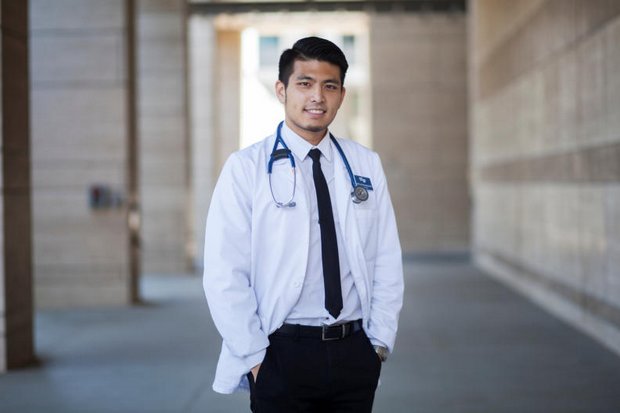
SAN FRANCISCO: Six illegal immigrants to the US have filed a lawsuit against the Trump administration over its decision to end an Obama-era programme to keep young illegals in the country indefinitely.
Jirayut "New" Latthivongskorn, who was brought illegally to the US by his "Robin Hood" parents when he was nine, has a DACA work authorisation expires in January 2019.
DACA stands for the Deferred Action for Childhood Arrivals programme initiated under ex-president Barack Obama. It allows children of illegal immigrants, known as "dreamers" to advocates of the project, to remain in the US indefinitely.
Jirayut joined the lawsuit on Monday. He is both a fourth year medical student at University of California San Francisco, and a master's degree candidate in public health at Harvard.
Jirayut tweeted the news he had joined the lawsuit. He also put details on his Instagram account.
His medical residency is not set to begin until next year, a few months after his current permission to remain runs out.
"I have all these big ideas about how I want to change the world and change systems around health care," he said. "The fact I might not be able to get there is troubling and frustrating."
Earlier this year, he was cited in the 2017 "30 under 30" list by Forbes magazine.
Mr Jirayut is the sixth dreamer to join the lawsuit filed by San Diego attorney Dulce Garcia. She has regularly defended clients in immigration court but now seeks legal relief of her own.
Brought to the United States illegally by her parents as a child, Garcia and the other five young illegals sued the Trump administration on Monday over its decision to end DACA, and to try to convince Congress to make the Obama decree US law.
Since it was authorised in 2012 by Obama, the programme has provided protection from deportation and the right to work legally to nearly 800,000 young people. But it has no official standing under US law and can be extended or ended at the whim of any president.
Garcia's case, filed in San Francisco federal court, is the first to be brought by the dreamers since US Attorney General Jeff Sessions announced earlier this month that the Obama-era policy would start winding down in March, 2018, according to Garcia's lawyers.
It is among several lawsuits challenging the decision to end DACA, including two cases brought by state attorneys general.
The legal claims in all of the cases, including Garcia's, are similar: that the Trump administration did not follow proper administrative procedure in rescinding DACA, and that making enforcement promises to a group of people, only to revoke them, violates due process.
The Trump administration has said it is ending DACA because Obama overstepped his constitutional authority when he bypassed Congress and created the DACA program unilaterally. President Donald Trump called on Congress to enact a law to protect DACA recipients and last week angered some of his fellow Republicans by negotiating with top congressional Democratic leaders on possible legislation.
During the 2016 presidential election Trump ran on a hardline immigration platform, promising to end DACA and strengthen border protections in order to increase jobs for US workers.
'I CRIED RIGHT THERE'
The daughter of a hotel housekeeper and a welder, Garcia arrived in Southern California from Mexico at the age of 4. A few years later, she said, her family was ousted from their apartment because the property contained illegal units.
"We were living out of my dad's truck for a little bit there," she said.
Garcia decided to become an attorney after working for a criminal defence lawyer in high school. She put herself through school working for lawyers and performing other jobs such as parking cars.
After Obama announced DACA in 2012, Garcia, now 34, seized the opportunity. When she filled out forms for a social security number in 2013, the government clerk congratulated her.
"I cried right there," she said.
The case on behalf of Garcia and other DACA recipients could be heard with two separately filed San Francisco DACA cases, one brought by the University of California and the other by a group of state attorneys general, led by California's Xavier Becerra. Another group of attorneys general, led by New York's Eric Schneiderman, filed a lawsuit over DACA on Sept 6 in Brooklyn federal court.
Legal experts have said court challenges to Trump's decision could face an uphill battle because a president typically has wide authority in implementing immigration policy.
Garcia said that having to advise some of her DACA clients that there may be no help for them while at the same time trying to address her own immigration status takes a toll.
"That's a reason why I don't do exclusively immigration law," she said. "It would wear me down too fast."